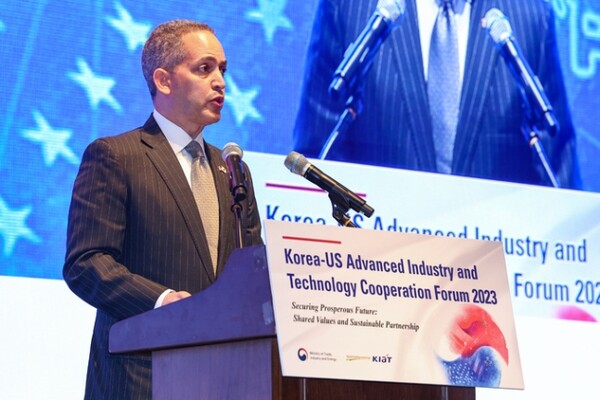Concerns Rise Over US Easing Controls on Semiconductor Equipment Exports to Korea

Don Graves, U.S. Commerce Secretary, delivers a speech at the 2nd US-Korea Advanced Industry Technology Cooperation Forum held at the Grand Hyatt Hotel in the Yongsan district of Seoul on Sept. 21.
Amid the so-called “Huawei Shock,” with the company launching its Mate 60 Pro smartphone equipped with a 7-nm semiconductor, the U.S. is tightening its stance on China. Observers are now keenly watching how far the repercussions of this tension between the two giants will spread.
As the end of the U.S. restrictions on semiconductor equipment exports to China looms, companies such as Samsung, SK, and Taiwan’s TSMC find themselves on high alert. While prevailing sentiment suggests that the U.S. might continue its leniency, considering allies’ concerns, some voices warn not to rule out a reversal.
According to industry sources on Sept. 21, the U.S. Department of Commerce has publicly expressed its displeasure about the “Huawei Shock,” hinting at potential additional sanctions.
On Sept. 19, U.S. Commerce Secretary Raimondo commented on Huawei’s new smartphone, stating she was “upset” and added, “There’s no evidence that China can manufacture 7-nm chips on a large scale. Any company found circumventing export controls will be rigorously investigated.”
The recent unveiling of Huawei’s Mate 60 Pro features their self-developed Kirin 9000s 5G smartphone AP produced using SMIC’s 7nm process, in China, surprising the industry. Despite U.S. sanctions restricting exports of equipment and materials for advanced semiconductors below 10 nm, China’s accomplishment with the 7-nm process signals significant implications. The fact that China, despite U.S. sanctions, showcased a smartphone with domestically produced technology has sparked criticism questioning the efficacy of U.S. actions against China.
Given the “Huawei Shock,” stronger U.S. sanctions against China are anticipated. With the semiconductor equipment export policy ending next month, the domestic semiconductor industry is bracing for potential changes.
Samsung Electronics operates NAND flash production and semiconductor assembly plants in Xi’an and Suzhou, China. SK hynix has a DRAM plant in Wuxi and an assembly plant in Chongqing. Additionally, there is a NAND factory in Dalian, acquired from Intel. The volume of DRAM and NAND chips these leading firms produce in China is significant. Samsung Electronics reportedly invested US$17.6 billion and SK hynix invested US$24.9 billion. Including the acquisition price for Solid State (Intel’s NAND business), the total reaches US$33.74 billion.
The U.S. government, last October, implemented measures to limit China’s access to advanced semiconductor technologies. However, exceptions were granted for companies like Samsung Electronics and SK hynix, allowing equipment imports for a year. This measure, extended once, is believed by industry insiders to end around Oct. 10.
Until recently, there was an expectation that the U.S. would continue to allow Samsung and SK hynix to bring semiconductor equipment into their Chinese factories. Both companies are on the U.S. Department of Commerce’s Validated End User (VEU) list, leading to the widespread belief that they wouldn’t face significant restrictions. However, in light of the recent “Huawei Shock,” domestic firms have grown more apprehensive.
Given the consistent concerns raised by allies like South Korea and the substantial share of the Chinese semiconductor market, the possibility of continued equipment imports remains high. However, there are strong voices advocating for tougher sanctions against China, leading to predictions that the U.S. government will deliberate until the last minute.
Meanwhile, visiting U.S. Commerce Secretary Don Graves, speaking on Sept. 21 about the ban on importing advanced semiconductor equipment into China, stated, “We want to make it clear that legitimate business activities of South Korean semiconductor companies in China can continue.”
Meeting the press at the South Korea-U.S. Advanced Industry Technology Cooperation Forum held at the Grand Hyatt Hotel in Seoul, Graves, when questioned about the extension of the exemption for Samsung and SK hynix, responded by saying, “I’d refrain from commenting on specific corporate issues,” but emphasized, “We don’t want to unnecessarily strangle U.S. allies, cooperating partners, and their semiconductor companies.” He added, “We understand the concerns of the semiconductor companies and will do everything possible to ensure they can continue their business operations.”
Jasmine Choi
pr@businesskorea.co.kr
Copyright © BusinessKorea. Prohibited from unauthorized reproduction and redistribution